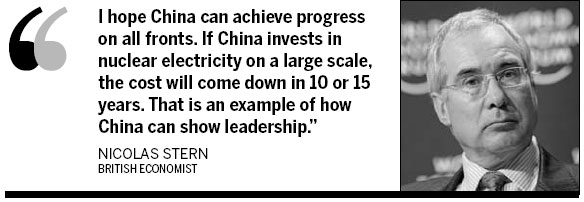China seen as major driver of renewable energy
China should build nuclear electricity generators on a large scale to reduce the burning of fossil fuels in its energy mix and set an example for the world, said British economist Lord Nicolas Stern.
"This is a front on which China could take strong leadership, showing technological progress and cost reductions that the rest of the world could emulate."
Stern was in Warsaw, Poland, for the UN Climate Change Conference that concluded on Friday after two weeks of meetings.

Stern is the former chief economist of the World Bank and is now a professor at the London School of Economics and Political Science. He is known worldwide for his Stern Review published in 2006 that estimated global economic losses from climate change.
After Japan's Fukushima nuclear accident in 2011, China halted all approvals for new nuclear plants even though it had unrolled ambitious plans to build the electrical generators in its central and western regions.
Xie Zhenhua, vice-minister of the National Development and Reform Commission, was also in Warsaw. He said China's pullback on its nuclear approvals is only "temporary", adding that the country would continue to build the power plants once safety is sufficiently demonstrated.
Stern said China has vast potential to seize the global lead by adopting renewable energy on a grand scale.
China has set a target to make the renewable sources account for 15 percent of its total energy consumption by 2020. The ratio currently stands at 9.6 percent. The country also plans to cut its carbon intensity by 40 to 45 percent by 2020 from its 2005 base.
"China has been on track to achieve those targets, which makes me optimistic," Stern said.
He added that the country has already shown worldwide leadership by committing to rigorous targets of emission control and by investing heavily in low-carbon technologies. "China is very competitive in solar power and wind farms," he said.
Stern said China could set a good example by scaling up renewable energy and combining that with more efficient energy consumption.
The world doesn't know exactly how or where every technology should be deployed, but it is important to include everything in the mix - including nuclear power plants - to achieve low-carbon targets.
"I am not in favor of focusing on just one thing," Stern said. "I hope China can achieve progress on all fronts."
After a scale-up of renewable energy sources, cost will be reduced and the rest of the world will follow suit, he said.
"If China invests in nuclear electricity on a large scale, the cost will come down in 10 or 15 years. That is an example of how China can show leadership."
Stern said the richer countries have missed an opportunity for investing in low-carbon technologies after the 2008 financial crisis.
"The recession diverted their attention," he said, "but they missed an opportunity as the interest rate was very low." He added that the window is still open.
Stern said he opposed the European Union's anti-dumping investigation into China's solar panel exports. The matter has now been settled amicably.
On the other hand, he enthusiastically welcomes the recent cooperative agreement between China and the UK on nuclear power, adding that China, the EU and the United States all needed to join hands in tackling climate threats.
Stern said the US also could play a major leadership role as it's rolling out plans to replace coal-fired power plants.
But not everyone seems to be fully on board with coping with climate change. The EU, for instance, is hesitating, while Australia, Japan and Canada have conveyed "worrisome" messages about their willingness to protect the earth.
Stern said he feels optimistic about China's thriving discussions in the energy arena and its willingness to tackle climate change and global warming.
He is especially excited to see China pushing for additional carbon reductions as part of its 13th Five-Year Plan (2016-20). Coal is expected to peak as an energy source in the next 10 years.
All the discussions are about more rigorous targets and the course China needs to set for its future, Stern said.
"I am optimistic," he said.
If the rest of the world sees China setting a higher bar, others will be more confident to do the same, he said.
"It is not about the negotiations, but it is about where the world is going. That is the kind of thing that shows China's leadership."
(China Daily 11/23/2013 page7)














